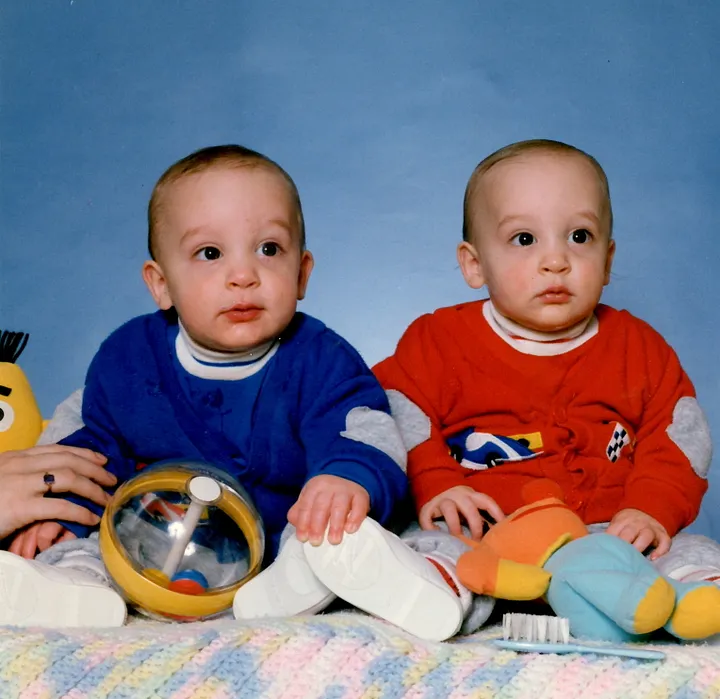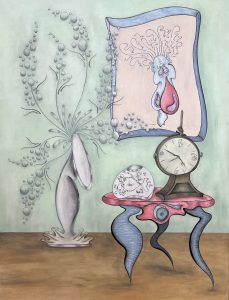False duality and poor reasoning
I often fear for my sons’ lives.
As identical twins, they can never escape the cognitive distortion of dichotomous reasoning. And my sons are not the only ones in danger. You, and everyone you know, is also a victim of this pernicious distortion.
Teachers, friends, family and strangers have approached my boys with scary, illogical and insipid assumptions and then treated them along those supposed lines. People assume because twins look alike, bookends, they must have Yin/Yang qualities. This treatment exposes my boys to ill-effect.
The first time I experienced it, I was ignorant of the duality bias, and of the common, distorted treatment towards twins. While in line at the grocery store, a stranger pointed at my little ones and asked me, “Which one is the good one and which one is the bad one?”
I could only stare as this pinnacle of women, this unrecognized genius, waited for me to answer. I responded with the suggestion that she purchase some vegetables and return the cola, twelve bags of chips, and the six bottles of wine to their respective shelves.
DICHOTOMOUS REASONING
Dichotomous reasoning (known as polarizing, duality bias, black-and-white reasoning, all-or-nothing thinking, either-or thinking) is seeing a choice or decision, or condition, as polar opposites with no range or scale in between.
The person identifies only extremes without recognizing a continuum. Notice the either/or pattern in the following examples:
- If you do not go to college, you will be a homeless!
- He doesn’t believe in God — he must be evil.
- The good guy always defeats the bad guy.
- I had a bad day/I had a good day.
- Liberals are educated and fair; conservatives are foolish and greedy.
- Conservatives are rational and moral; liberals are emotional and immoral.
Humans have a tendency to define things in extremes and to ignore complexity. We attempt to oversimplify things into these dichotomies: yes or no, this or that, up or down, good or bad. For example, we act as if we have only two political parties. Complexity, however, is realistic. We have hundreds of political parties.
Similarly, a person is not strictly bad or good. This is one reason complex characters in movies and books are so interesting: The hero has flaws and is not perfect; the villain loves her family. A critical thinker understands that complexity and does not see life as black and white but as a rainbow of colors (and a lot of grey areas).
Typically, we describe the psychological condition as splitting, where a patient defines himself or herself as bad or good — and does not recognize he or she is a whole array of characteristics. This is a common defense mechanism often expressed in fallacious thinking.
FALLACY: FALSE DILEMMA
False Dilemma (Forcing a Dichotomy), one of my favorite fallacies to identify, is committed when the proponent offers only two choices — one bad or disfavored and one good or favored. The choices seem mutually exclusive (cannot both be true at the same time) — but often are not. For example, alive or dead is mutually exclusive. Heads or tails in a coin toss are mutually exclusive. Turning left or right is mutually exclusive. Both cannot be true at the same time. But driving and texting are not mutually exclusive. You shouldn’t do it, but you can do it.
This oversimplification is highly compelling and persuasive for those who do not think critically. When we think of fallacies or illogical reasoning, we often assume the errors are obvious and easy to spot. Not so! Fallacies are so powerful because they are convincing. Consider the false dilemma evident when people argue if you accept science, you must reject religion. A career woman is not a good mother. A stay-at-home mom is not skilled or intelligent enough to have a career. Have some cake or be miserable!
I remember when my parents told me I could continue college or be a loser, I called them out on the fallacy. Either/or is misguided. Other choices exist along realistic continuums. I also hear this one from clients: My investment advisor said I should get a reverse mortgage or lose my home. Although the option of a reverse mortgage is an option, other options exist. And, frankly, investment advisors should not be giving legal advice!
Consider how dichotomous reasoning affects your life. Do we only have two political parties? Is a particular food good or bad? Is anything you judge purely black or white? Consider the false constructs we suffer. We make the snap decisions without deep consideration.
“You’re with us or against us.”
HANDLING BIAS
I’m most concerned with how people define my twin sons. Over the years, other commentary-queries have included:
- Who is the smart one, and who is the dumb one?
- Who loves mom more and who loves dad more?
- Who is the extrovert, and who is the introvert?
- Who is clean and who is messy?
- Who likes sports and who likes art?
- And, my favorite request is when the question implies one of my sons as a sociopath: who is loving and who is cold?
An unnamed close family member suspected one son as loving and the other son as colder, so that person gave the judged loving one all the attention. In that commentator, we see the results of not embracing Spartan practices of throwing such a thinker over the cliff. That person’s distorted oversimplification resulted in a self-fulfilling prophecy and the Pygmalion Effect I combated, watching one son feel loved and the other ignored.
By the time the boys were seven years old, we three had become callused about the comments and adept at disarming the speaker. Even a child can grasp the illogic of either-or thinking. My boys recognized that life occurs along a scale from black through all shades of gray to while. And our team had an unspoken modus, an agreement, a pact.
“Who is the bad one?” the lady at the t-ball game asked, while gesturing to my boys.
With a glance at my sons, I activated their sense of timing as I said, “I forgot how I dressed them this morning. It could be him. No, wait. Or him. Well… just watch your ankles. One of them is quite dangerous.”
Both boys smiled innocently.



